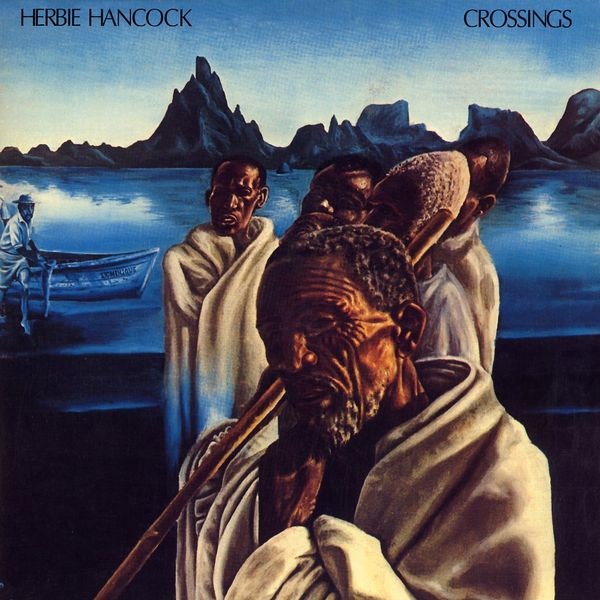
Exposé Online
What's old
Exposé print issues (1993-2011)
- 1 (October 1993)
- 2 (February 1994)
- 3 (May 1994)
- 4 (August 1994)
- 5 (October 1994)
- 6 (March 1995)
- 7 (July 1995)
- 8 (November 1995)
- 9 (March 1996)
- 10 (August 1996)
- 11 (February 1997)
- 12 (May 1997)
- 13 (October 1997)
- 14 (February 1998)
- 15 (July 1998)
- 16 (January 1999)
- 17 (April 1999)
- 18 (November 1999)
- 19 (May 2000)
- 20 (October 2000)
- 21 (March 2001)
- 22 (July 2001)
- 23 (December 2001)
- 24 (April 2002)
- 25 (September 2002)
- 26 (February 2003)
- 27 (August 2003)
- 28 (December 2003)
- 29 (April 2004)
- 30 (September 2004)
- 31 (March 2005)
- 32 (September 2005)
- 33 (May 2006)
- 34 (March 2007)
- 35 (January 2008)
- 36 (October 2008)
- 37 (July 2009)
- 38 (July 2010)
- 39 (Summer 2011)
Reviews
Herbie Hancock — Crossings
(Warner Bros 9362-47542-2, 1972/2001, CD)
by Mike McLatchey, Published 2017-11-02

I spent some time last year going through The Complete Columbia Albums Collection of Herbie Hancock. I bought it hoping that there would be some gems I didn't know about after Man-Child and ended up being vastly disappointed. I'm still not sure if most of these 70s and 80s works were quite bad, ill-advised attempts to marry innovation and popularity, or just way over my head. So it has been a bit of a relief to turn back to the man's early electric period where his finest work was accomplished. This period is perhaps a bit veiled from history as Hancock and his bands (Mwandishi here) were performing live and improvising considerably and so the albums of the time tend to be distillations of that work. Through this period he transitioned out of his early Blue Note jazz works, started doing soundtrack work, and crossed over into electric jazz, basically along the same time period of his mentor Miles Davis. He did the funky Fat Albert Rotunda, which was largely shorter, more focused pieces but started shifting more radically into free electric jazz with the Mwandishi album and then finishing up his early period on Warner by releasing the masterpiece known as Crossings. To this day I think Crossings is an unusual work, almost hard to grasp at times, for this write up I played it twice to get a bit more of a grip on it. I found strangely enough that a lot of this work seemed to parallel Soft Machine and Nucleus with an electric jazz that had a lot of more composed moments and quite a bit of twisting and turning. This music on his live parallel stretched out a bit more (“Water Torture” in particular), but the studio recordings had an almost fragile feel as if Herbie hadn't quite charted out his path yet outside of what Miles was doing. Crossings ends up being a really dense work, perhaps dominated by the great “Sleeping Giant” suite, a title fairly amusing when you think what woke up next. He may have not completely left the shadow of Miles Davis behind here but he was about to.
Filed under: Reissues, 2001 releases, 1972 recordings
Related artist(s): Bennie Maupin, Herbie Hancock, Dr. Patrick Gleeson, Eddie Henderson, Julian Priester
What's new
These are the most recent changes made to artists, releases, and articles.
- Release: Thierry Zaboitzeff - Artefacts
Updated 2026-02-27 00:16:46 - Review: Kevin Kastning - Codex I & Codex II
Published 2026-02-27 - Release: Zan Zone - The Rock Is Still Rollin'
Updated 2026-02-26 23:26:09 - Release: The Leemoo Gang - A Family Business
Updated 2026-02-26 23:07:29 - Release: Ciolkowska - Bomba Nastoyashchego
Updated 2026-02-26 13:08:55 - Review: Immensity Crumb - Chamber Music for Sleeping Giants
Published 2026-02-26 - Release: The Gatekeepers - Diary of a Teenage Prophet
Updated 2026-02-25 15:55:58 - Listen and discover: Mordecai Smyth will not break your back
Published 2026-02-25 - Review: Mars Lasar - Grand Canyon
Published 2026-02-25 - Release: Tashi Wada - What Is Not Strange?
Updated 2026-02-24 14:56:16 - Artist: Tashi Wada
Updated 2026-02-24 14:54:34 - Release: Greg Segal - Maintain!
Updated 2026-02-24 00:38:03 - Review: Il Segno del Comando - Sublimazione - Live
Published 2026-02-24 - Review: Nektar - Mission to Mars & Fortyfied
Published 2026-02-23 - Review: Jaime Rosas - Tres Piezas de Rock Progresivo
Published 2026-02-22 - Release: Kevin Kastning & Bruno Råberg - Across Tall Rain
Updated 2026-02-21 00:42:08 - Review: Gary Husband - Postcards from the Past
Published 2026-02-21 - Release: Daniel Crommie - Februa
Updated 2026-02-20 14:23:17
